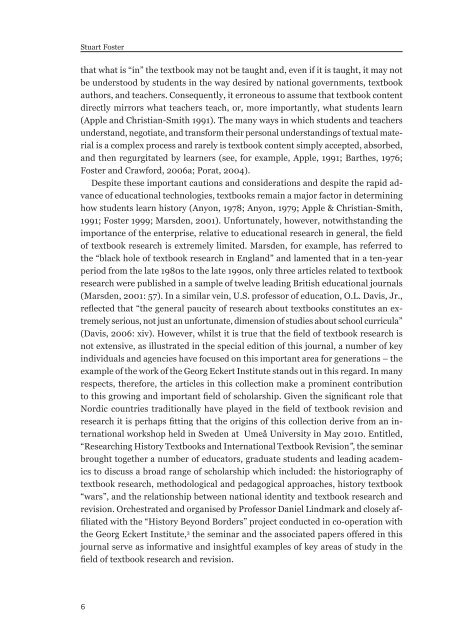Download issue - Umeå universitet
Download issue - Umeå universitet
Download issue - Umeå universitet
Create successful ePaper yourself
Turn your PDF publications into a flip-book with our unique Google optimized e-Paper software.
Stuart Foster<br />
that what is “in” the textbook may not be taught and, even if it is taught, it may not<br />
be understood by students in the way desired by national governments, textbook<br />
authors, and teachers. Consequently, it erroneous to assume that textbook content<br />
directly mirrors what teachers teach, or, more importantly, what students learn<br />
(Apple and Christian-Smith 1991). The many ways in which students and teachers<br />
understand, negotiate, and transform their personal understandings of textual material<br />
is a complex process and rarely is textbook content simply accepted, absorbed,<br />
and then regurgitated by learners (see, for example, Apple, 1991; Barthes, 1976;<br />
Foster and Crawford, 2006a; Porat, 2004).<br />
Despite these important cautions and considerations and despite the rapid advance<br />
of educational technologies, textbooks remain a major factor in determining<br />
how students learn history (Anyon, 1978; Anyon, 1979; Apple & Christian-Smith,<br />
1991; Foster 1999; Marsden, 2001). Unfortunately, however, notwithstanding the<br />
importance of the enterprise, relative to educational research in general, the field<br />
of textbook research is extremely limited. Marsden, for example, has referred to<br />
the “black hole of textbook research in England” and lamented that in a ten-year<br />
period from the late 1980s to the late 1990s, only three articles related to textbook<br />
research were published in a sample of twelve leading British educational journals<br />
(Marsden, 2001: 57). In a similar vein, U.S. professor of education, O.L. Davis, Jr.,<br />
reflected that “the general paucity of research about textbooks constitutes an extremely<br />
serious, not just an unfortunate, dimension of studies about school curricula”<br />
(Davis, 2006: xiv). However, whilst it is true that the field of textbook research is<br />
not extensive, as illustrated in the special edition of this journal, a number of key<br />
individuals and agencies have focused on this important area for generations – the<br />
example of the work of the Georg Eckert Institute stands out in this regard. In many<br />
respects, therefore, the articles in this collection make a prominent contribution<br />
to this growing and important field of scholarship. Given the significant role that<br />
Nordic countries traditionally have played in the field of textbook revision and<br />
research it is perhaps fitting that the origins of this collection derive from an international<br />
workshop held in Sweden at <strong>Umeå</strong> University in May 2010. Entitled,<br />
“Researching History Textbooks and International Textbook Revision”, the seminar<br />
brought together a number of educators, graduate students and leading academics<br />
to discuss a broad range of scholarship which included: the historiography of<br />
textbook research, methodological and pedagogical approaches, history textbook<br />
“wars”, and the relationship between national identity and textbook research and<br />
revision. Orchestrated and organised by Professor Daniel Lindmark and closely affiliated<br />
with the “History Beyond Borders” project conducted in co-operation with<br />
the Georg Eckert Institute, 3 the seminar and the associated papers offered in this<br />
journal serve as informative and insightful examples of key areas of study in the<br />
field of textbook research and revision.<br />
6

















